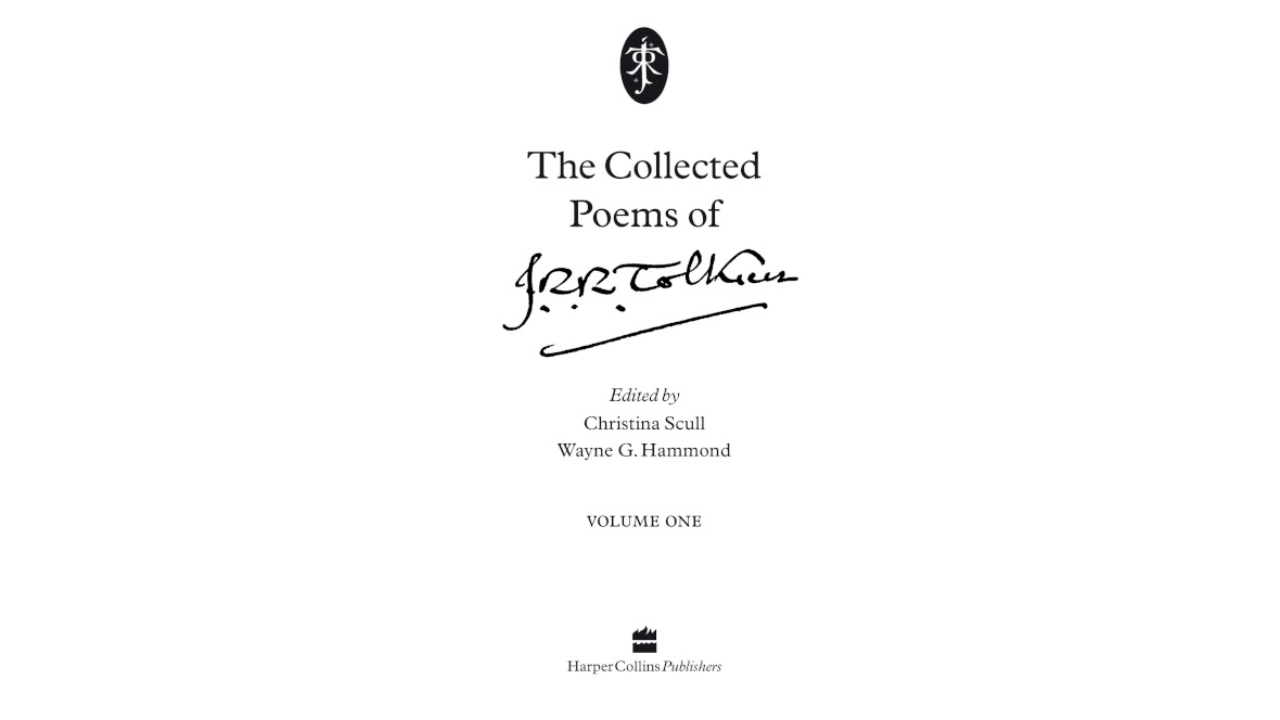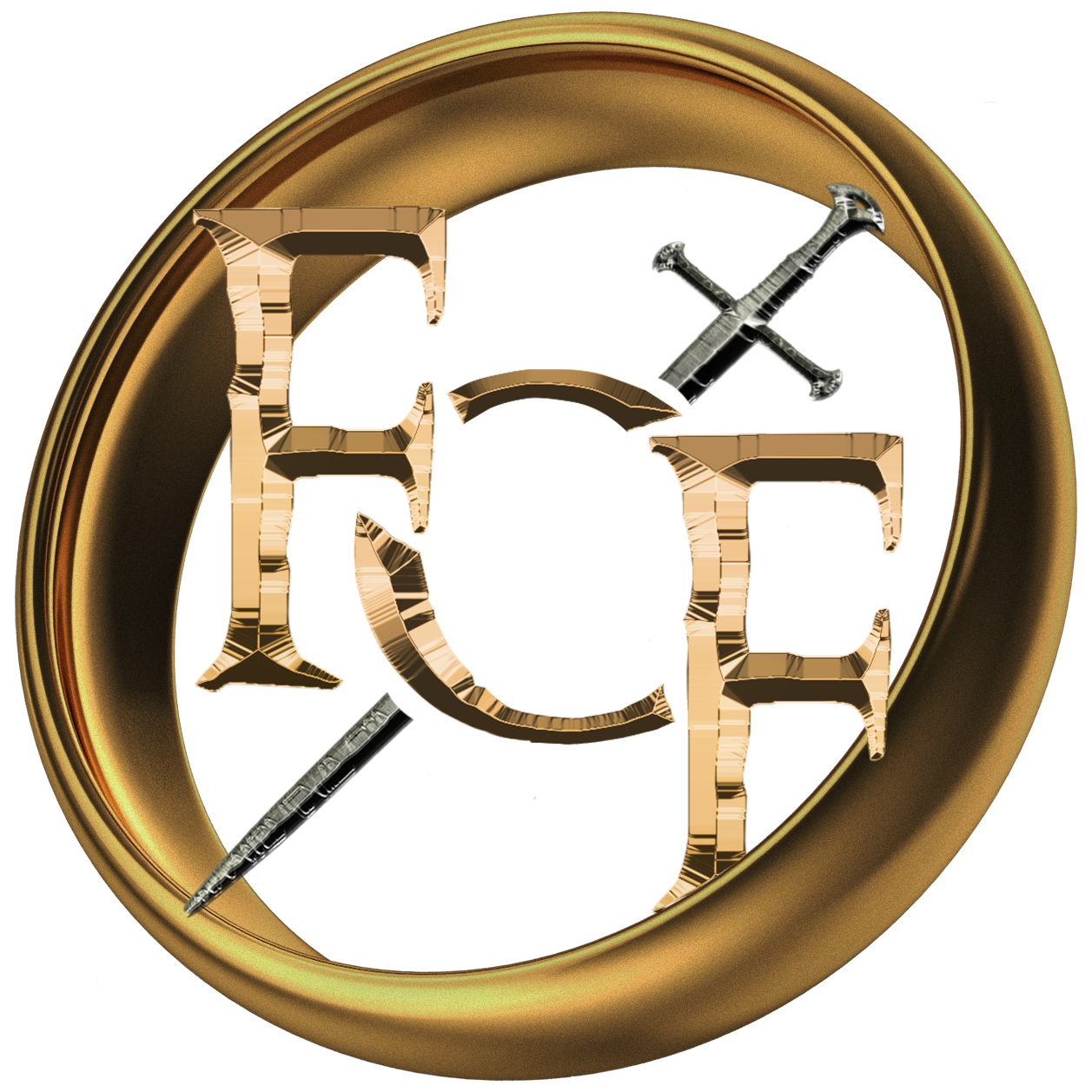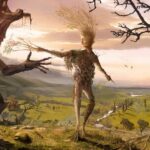
The Collected Poems of J.R.R. Tolkien to be published in September
HarperCollins has recently announced the publication of a three-volume hardcover boxed set containing a collection of the poetry of J.R.R. Tolkien. The collection, titled The Collected Poems of J. R. R. Tolkien, is edited by Wayne G. Hammond and Christina Scull, who are perhaps best known as co-authors of The Lord of the Rings: A Reader’s Companion and The J. R. R. Tolkien Companion and Guide. Nearly 200 separate poems are included in the collection, including different versions of some of them, bringing the total up to some 240 poems, including over 60 poems that have never been published before. The collection is due to be published on September 12, 2024, and is currently available for pre-order at Amazon UK.
Despite the number of poems, the three-volume set is not a complete collection of Tolkien’s poetry. The focus is on Tolkien’s development as a poet, the variety of poetry that he wrote, and particularly on poems that were previously unpublished, or that are only found in difficult-to-obtain publications. The collection contains a representative selection of poetry from The Hobbit and The Lord of the Rings, but does not contain every poem found in those works, as most people who would be interested in this boxed set likely already own them, and if not, should find them easy to obtain. Likewise, some longer poems, such as those found in The Lays of Beleriand, The Fall of Arthur, and The Legend of Sigurd and Gudrún, are also included only as excerpts. In addition, the collection contains some excerpts from Tolkien’s Modern English translations of medieval poems such as Beowulf and Sir Gawain and the Green Knight.
As a child, Tolkien’s love of literature began with prose fairytales—a love he never outgrew. So perhaps it is fitting that he is best known for his prose works. Nevertheless, as he grew older, he also developed a taste for poetry, from the Greek and Latin classics, to Germanic heroic verse, to the Finnish Kalevala. He also enjoyed the poetry that flourished in his own West Midlands region of England during the later Middle Ages, producing such works as Sir Gawain and the Green Knight and Pearl. Among his contemporary influences, he also admired the work of the Catholic poet Francis Thompson.
It is fair to say that poetry, along with language invention, was the seed from which Tolkien’s legendarium sprang. As is fairly well documented, the initial spark came from a few lines in the Old English poem Crist, comparing John the Baptist heralding the ministry of Jesus Christ to the morning star heralding the dawning sun:
Ēalā Ēarendel, engla beorhtast,
ofer middangeard monnum sended“Hail Earendel, brightest of angels,
sent over Middle-earth to men”
Tolkien responded to this poetic inspiration with poetry of his own. The first work in what would eventually become his legendarium was the poem The Voyage of Éarendel the Evening Star, written in September of 1914. Encouraged by his friends, Tolkien saw himself at that time largely as a poet, drawing inspiration from the great poetic works of the past to ennoble the literature of the present. As early as 1916 he attempted to publish a book of poems titled The Trumpets of Faerie, with two further attempts in the 1920s. Athough his first attempt at a coherent narrative of what would later become The Silmarillion was mostly prose, interspersed with poems, in the 1920s he engaged in an ambitious attempt to tell the entire story in a series of five lengthy poems. Only two of them came anywhere close to completion. As it turned out, Tolkien’s first widely published work was a prose fairy tale he devised primarily for the entertainment of his children—The Hobbit. Due to the success of The Hobbit, a sequel was called for, which became The Lord of the Rings, and which was written in a similar style, though less specifically intended for children.
Although The Hobbit and The Lord of the Rings are primarily works of prose, they are both liberally interspersed with poetry, far more than most modern prose literature. The Hobbit contains thirteen poems. Some of the better known poems include “Chip the Glasses and Crack the Plates”, “Roads Go Ever, Ever On”, and “Far Over the Misty Mountains Cold”:
Far over the misty mountains cold
To dungeons deep and caverns old
We must away, ere break of day,
To find our long-forgotten gold.
The Lord of the Rings contains over sixty poems, though some are variations on each other. Some of the better known include “The Road Goes Ever On and On” (three variations on the poem in The Hobbit), “The Fall of Gil-galad”, “A Elbereth Gilthoniel”, “Namárië”, “Lament for the Rohirrim” (“Where now the Horse and the Rider?”), and “Arise, Arise, Riders of Théoden!”. However, there are two poems that are so well known that even those who have never read Tolkien (or even watched a Tolkien film or television adaptation) have likely been exposed to them. One, of course, is the Ring Verse (“Three Rings for the Elven-Kings Under the Sky”), of which the most well-known lines are lines 6 and 7, those inscribed (in the speech of Mordor) on the One Ring:
Three Rings for the Elven-kings under the sky,
Seven for the Dwarf-lords in their halls of stone,
Nine for Mortal Men doomed to die,
One for the Dark Lord on his dark throne
In the Land of Mordor where the Shadows lie.
One Ring to rule them all, One Ring to find them,
One Ring to bring them all, and in the darkness bind them
In the Land of Mordor where the Shadows lie.
The other poem is the Riddle of Strider (“All That Is Gold Does Not Glitter”), particularly the first two lines:
All that is gold does not glitter,
Not all those who wander are lost;
The old that is strong does not wither,
Deep roots are not reached by the frost.
From the ashes a fire shall be woken,
A light from the shadows shall spring;
Renewed shall be blade that was broken,
The crownless again shall be king.
Not all of Tolkien’s poetry was directly connected to his legendarium, nor was all of it of a serious nature. He composed a variety of poems, from the mock epic “The Battle of the Eastern Field” in 1911 to the brief tribute “For W.H.A.” in 1967. (This new collection apparently contains a love poem written even earlier, in 1910.) His poetry was included in numerous collections, notably including A Northern Venture (1923), Songs for the Philologists (1936), and The Adventures of Tom Bombadil and Other Verses from the Red Book (1962). Most of his published poetry is in Modern English, but he composed in other languages as well, including Old English, Gothic, and his invented languages Quenya and Sindarin. Even in his Modern English poetry he sometimes made use of literary techniques from another era. Poems such as “The Long List of the Ents”, “From Dark Dunharrow in the Dim Morning”, and “Song of the Mounds of Mundburg” use alliterative verse typical of Old English and other ancient Germanic poetry, rather than end rhyme, but are written in Modern English. Although Tolkien did not achieve great success in reviving alliterative verse, if such was his aim, as a professor at Oxford he did inspire at least one of his students, the renowned poet W.H. Auden (the aforementioned “W.H.A.”), to employ the style.
The Collected Poems of J.R.R. Tolkien has been nearly eight years in the making. HarperCollins first suggested the idea to Hammond and Scull in 2016, and the editors worked with the late Christopher Tolkien, as his father’s literary executor, to bring the collection from concept to reality. In addition to works published and widely available, the editors have been able to gain access to relevant manuscripts and typescripts at the University of Leeds, the Bodleian Library, Marquette University, and, late in the book’s development, from the archive of C.S. Lewis scholar Walter Hooper.
The exact contents of the collection are not yet known publicly. Of Tolkien’s published works, among the most welcome to Tolkien fans would be all his poems from Songs for the Philologists, a book that is rare and difficult to come by, though some poems have been published elsewhere. Among Tolkien’s unpublished poetry, perhaps the most anticipated is The Complaint of Mîm the Dwarf, regarding a character from The Silmarillion. A German translation was published in 1987, but the English original has never been published. It is to be hoped that the editors have been able to locate the original. A list of Tolkien’s unpublished poems (those that are known of, anyway) may be found on Tolkien Gateway.




No Comments